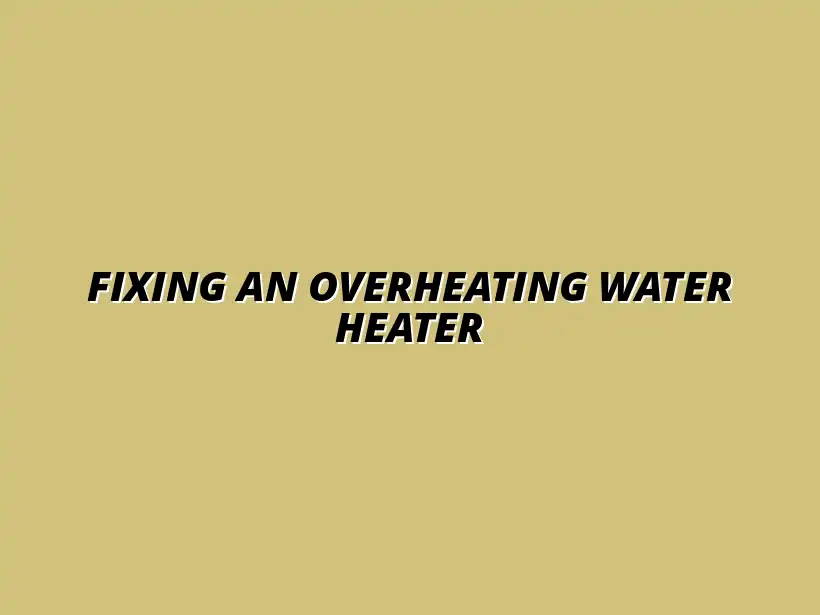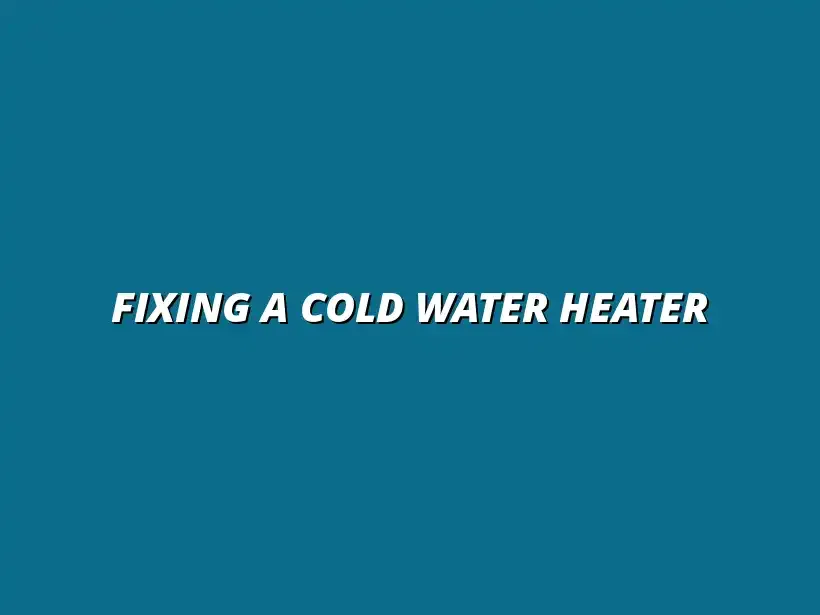
Fixing an Overheating Water Heater
Understanding Water Heater Overheating: Causes and Consequences
Water heaters are essential appliances that provide us with hot water for various needs, from showering to washing dishes. However, when they overheat, it can lead to serious problems. Understanding the causes and consequences of water heater overheating is crucial for ensuring safety and maintaining efficiency.
Overheating can stem from various factors, and it's important to recognize them early to avoid damage or hazards. In this section, we'll explore the common reasons behind water heater overheating, as well as the risks associated with these issues. Regular maintenance, such as that described in this guide on maintaining your water heater regularly, can prevent many problems.
Common Reasons for Water Heater Overheating
Several factors can lead to a water heater overheating. Recognizing these causes can help in taking preventive measures before problems escalate. Below are the most common reasons:
- Thermostat malfunctions
- Heating elements issues
- Sediment buildup
Thermostat Malfunctions and Their Impact
A malfunctioning thermostat is one of the primary reasons for overheating. If the thermostat fails to signal the heating elements to turn off, the water temperature can rise uncontrollably. This can result in water that is not just hot, but dangerously hot.
When the thermostat is not calibrated correctly, it can lead to inconsistent water temperatures. This inconsistency not only affects comfort but can also signify larger issues within the water heater system. Regular checks can prevent this from becoming a major problem!
Issues with Heating Elements Leading to Overheating
Heating elements are responsible for warming the water in your tank. If these elements are damaged or malfunctioning, they may not shut off when they should, leading to overheating. Signs of faulty heating elements include excessive noise or visible wear and tear.
In some cases, the heating elements can become short-circuited, forcing them to run continuously. This constant operation can lead to significant increases in your energy bills and potential damage to the water heater. If your water heater won't start, this guide on fixing a water heater that won't start may be helpful. Regular inspections can help identify these problems early!
Water Heater Sediment Buildup: A Silent Culprit
Sediment buildup in the tank can create a host of problems, including overheating. Over time, minerals from hard water can settle at the bottom of the tank, insulating the water from the heating elements. This insulation can cause the heating elements to work harder, leading to excessive temperatures.
If left unchecked, sediment buildup can not only lead to overheating but also reduce the efficiency of the water heater. Flushing the tank regularly can prevent sediment from accumulating and maintain optimal performance. For efficient water heater maintenance, consult this resource on maintaining your water heater efficiently. Don't wait until it's too late!
The Risks Associated with Overheating Water Heaters
Overheating water heaters pose several risks that can seriously affect both your appliance and safety. Understanding these risks will help you appreciate the importance of regular maintenance and prompt repairs. Here are some of the significant risks involved:
- Potential damage to the water heater system
- Safety hazards like scalding
- Increased energy costs
Potential Damage to the Water Heater System
When a water heater overheats, it can lead to significant damage to the entire unit. The pressure release valve may fail, causing water to leak or even burst from the tank. If you have a leaking water heater pipe, this guide on repairing a leaking water heater pipe offers solutions. This not only results in costly repairs but can also lead to water damage in your home.
Moreover, prolonged overheating can reduce the lifespan of your water heater. When essential components wear out quickly, you may find yourself needing a replacement sooner than expected. Managing overheating is key to protecting your investment!
Safety Hazards: Scalding and Pressure Build-Up
One of the most concerning risks associated with overheating water heaters is the potential for scalding. When water reaches extreme temperatures, it can cause severe burns if someone accidentally comes into contact with it. Children and elderly individuals are especially vulnerable.
Additionally, overheating can lead to dangerous pressure build-up within the tank. If the pressure becomes too high, it can create a risk of explosion. Keeping an eye on the temperature and pressure gauges is essential for safety!
Effects on Energy Efficiency and Utility Bills
Overheating not only affects your water heater's functionality but also its energy efficiency. When the system works harder to maintain high temperatures, it consumes more energy, leading to inflated utility bills. You might find that your monthly expenses unexpectedly increase!
By addressing overheating issues promptly, you can help your water heater operate more efficiently. This proactive approach can save you money in the long run, making it a win-win situation for your wallet and your home!
Practical Solutions for Repairing an Overheating Water Heater
If your water heater is overheating, don't panic! There are several practical solutions you can implement to tackle the issue. Understanding the root cause can guide you to the most effective fix, and often, adjustments can be made without calling a professional. For more complex issues, consider contacting a local plumber, such as finding a plumber in Billesley, Birmingham.
In this section, I’ll explore different methods ranging from simple thermostat adjustments to tackling more complex issues like sediment buildup. Each solution will help you keep your water heater running safely and efficiently.
Adjusting the Thermostat: A Simple Fix
Sometimes, a simple adjustment to the thermostat can ease the overheating problem. Start by checking if the thermostat is set too high — the recommended temperature is usually around 120°F (49°C). If it’s set higher, lower it gradually.
To ensure safety during this process, follow these steps:
- Turn off the power supply to your water heater.
- Remove the access panel on the thermostat.
- Use a flathead screwdriver to adjust the temperature dial.
- Replace the access panel and restore power.
How to Safely Check and Adjust the Thermostat Settings
When adjusting the thermostat settings, it’s crucial to do so safely. Make sure to follow these guidelines:
- Turn off the power to prevent electrical shocks.
- Use a multimeter to check the current temperature.
- Adjust the settings incrementally, monitoring changes over time.
Adjusting the thermostat can be a straightforward fix, but if you find it constantly needs adjustment, you might need to consider replacing it.
When to Replace the Thermostat Instead of Repairing
If your thermostat frequently malfunctions, it might be time to replace it. Signs that replacement is necessary include:
- Inconsistent water temperatures.
- Frequent overheating episodes.
- Visible damage or corrosion on the thermostat.
Replacing a faulty thermostat can enhance your water heater's performance and energy efficiency significantly!
Cleaning or Replacing Heating Elements
Heating elements can also contribute to overheating issues. If your water heater is not heating properly, it could be a sign that these elements are worn out or covered in sediment. Regular inspection and maintenance of the heating elements are essential.
Here's how to identify if your heating elements are faulty:
- Check for rust or corrosion on the elements.
- Listen for unusual noises like popping or banging.
- Test the elements with a multimeter for electrical continuity.
Step-by-Step Instructions for Cleaning and Replacement
Cleaning or replacing heating elements can be tackled with some basic tools. Follow these steps for effective maintenance:
- Turn off the water heater and disconnect the power supply.
- Drain the tank partially to avoid spills.
- Remove the access covers and unscrew the heating elements.
- Clean the elements with a wire brush, or replace them if necessary.
- Reassemble everything and refill the tank before restoring power.
Regularly attending to your heating elements can prolong the life of your water heater and prevent overheating issues!
Addressing Sediment Buildup in the Tank
Over time, sediment can accumulate in the tank, causing overheating and inefficiency. Flushing your water heater regularly is essential to ensure optimal performance. Addressing clogs elsewhere in your plumbing system, like a clogged toilet (see this guide on fixing a clogged toilet) can sometimes indirectly impact water heater performance. Sediment buildup can lead to a range of problems, including reduced heating capacity and increased energy consumption.
To effectively flush your water heater, follow these steps:
- Turn off the power and water supply to the heater.
- Attach a hose to the drain valve and direct it outside or to a drain.
- Open the drain valve and allow the tank to empty.
- Once empty, briefly turn on the cold water supply to stir up the sediment.
- Close the drain valve, refill the tank, and restore power.
Preventative Measures to Avoid Future Buildup
To prevent sediment buildup in the future, consider implementing these practices:
- Flush your water heater every six months.
- Install a water softener if you have hard water.
- Regularly check and maintain the heating elements.
By taking these preventive steps, you can keep your water heater running smoothly and efficiently!
Frequently Asked Questions about Overheating Water Heaters
As you navigate the complexities of managing an overheating water heater, you might have some questions. I’ll address common concerns, from immediate actions you can take to when it's best to call a professional. If you're dealing with other plumbing issues, like a clogged sink, a plunger can often help. Check out this guide on using a plunger to unclog your sink. If you ever feel unsure, don’t hesitate to seek help! After all, keeping your water heater in top shape is crucial for your home’s safety and efficiency.




